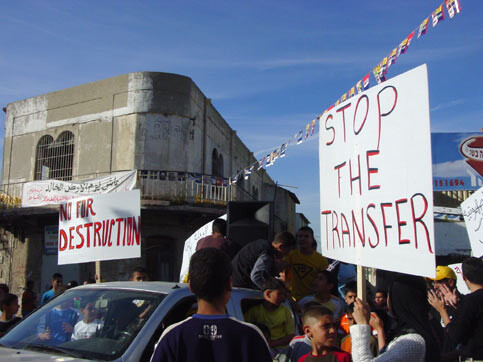I'lam - Media Center for Palestinians in Israel 21 April 2006

Also in this Briefing
On 30 March, Palestinians across the Middle East staged demonstrations marking the 30th Land Day. Protests inside Israel have especial poignancy as the tragic event that Land Day commemorates occurred inside Israel, in the Galilee.

Palestinians in Lid gather for a Land Day demonstration to protest ongoing expropriation and ethnic cleansing. (Gabriela Becker)
In March 1976, the Israeli government under Yitzhak Rabin prepared to confiscate a swath of Arab farming land, following decades of similar expropriations, as part of renewed attempts at Judaising (making more Jewish) the Galilee. The Judaisation plan was revealed in an internal government memorandum from the time known as the Koenig Report, published by Yisrael Koening, the head of the northern district of the Interior Ministry.
In response, the Arab leadership inside Israel declared a general strike, the first in the community’s history.
Rabin authorised the security forces to storm the villages of Deir Hanna, Arrabeh and Sakhnin to break up large protests against the harsh land confiscations that affected all three villages. Six protesters were killed as a result. No public inquiry was ever held into the security forces’ conduct on that day, nor was there any investigation of the six deaths.
The local leadership arranged for the anniversary of the killings to be marked by an annual Land Day, an event that has been adopted by other Palestinian communities in the Middle East to highlight not only the historic dispossessions of the Palestinian people by Israel in 1948 and 1967 but Israel’s continuing attempts to control and take Palestinian land on spurious grounds inside Israel and the occupied territories.
This year demonstrations were held in the Galilee, the Negev, Jerusalem, Hebron and the Jordan Valley. The central event, however, was held in Lyd (in Hebrew, Lod), a “mixed city” close to Tel Aviv where small poor Arab neighbourhoods survive next to a Jewish city.
All but 1,000 of the 40,000 Palestinian inhabitants of Lyd were expelled in July 1948, when Israel’s first prime minister, David Ben-Gurion, approved the city’s ethnic cleansing. This is revealed in an entry in Rabin’s diary which was censored by the Israeli authorities for many years before finally being published in the New York Times in 1979.
According to Rabin, General Yigal Allon, the commander of Israel’s elite Palmach soldiers, discussed the treatment of Lyd’s population with Ben-Gurion. “We walked outside, Ben-Gurion accompanying us. Allon repeated his question, ‘What is to be done with the Palestinian population?’ Ben-Gurion waved his hand in a gesture which said ‘Drive them out!’ “
Rabin then passed on the message to army headquarters: “The residents of Lyd must be expelled quickly, without classifying them according to age … Implement immediately.”
Although few of Lyd’s original inhabitants remained (most who were allowed to stay were needed to operate the main railway lines and junctions that ran through Lyd), in the 1950s Israel brought Bedouin farmers from the Negev to live in Lyd’s Arab ghetto neighbourhoods so that they could work as cheap labourers in the construction industry needed to build the Jewish towns and cities of the coastal plain. Today, Lyd has a total population of about 75,000, of which three-quarters are Jewish.
The Arab inhabitants of Lyd and are still suffering from official land policies that overtly discriminate against them. The most pressing concern is the issuing by the authorities of some 500 demolition orders against Arab homeowners. According to local leaders, another 2,500 Arab homes are under threat of demolition.
Over the past two years, local inhabitants have tried to fight the demolitions, setting up action committees, but have only further incurred the wrath of the authorities, which carried out 10 demolitions in the run-up to Land Day, making dozens of families homeless.
On 15 March, 500 members of the Israeli security services surrounded the Arab neighbourhood of Dahmash to enforce the demolition of four homes. A total of 32 people from the Zabarga family were made homeless, including more than 20 children.
Although the Israeli authorities accuse Arab citizens across the country of building unlicensed homes this is a reflection of official policy: despite rapidly growing populations, no new Arab towns and villages have been approved in the country’s history and existing communities are deprived of new master plans that would establish new neighbourhoods in which legal house building would be possible.
Mohammed Abu Shraiqi, an Arab member of Lyd council, said: “Unfortunately, the Israeli authorities are demolishing homes which they claim are unlicensed without offering just alternatives for the natural growth of the Arab population in the city. Since 1948, there has been no plan for any Arab neighbourhood in Lyd.”
I’lam Media Center for Arab Palestinians in Israel is a non-profit organization based in Nazareth. It was founded in 2000, by a group of Arab journalists and academics. As the only Arab Palestinian media organization in Israel, I’lam is deeply committed to the democratization of media policies, media practices, and the media landscape in Israel.
Related Links:


